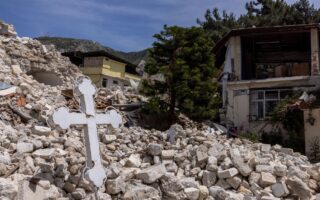What’s missing from the pre-election debate

There’s a string of genuinely important subjects that have to do with the country’s future which are missing from the public debate as Greece heads into general elections. It is not only important issues that are absent from the pre-election agenda, but especially a vision for Greece in the 21st century, driven by a strategic plan for its recovery and international advancement.
1. Foreign policy
The world is going through enormous changes that are causing massive shifts in geopolitical parameters. The West no longer has the drive or clout it once did and the East is growing at a much more rapid pace. These changes have a direct impact on our neighborhood – the Balkans as much as the East Mediterranean – while compounding the problems of European unification. Russia’s invasion of Ukraine has cast doubt over the efficiency of Europe’s peace, security and stability structures, as well as over the enforcement of international law, such as with regard to the inviolability of sovereign borders. Yet there appears to be no appetite for a discussion on these changes in Greece or, perhaps, the parties in question simply have nothing new to add about the country’s future in this international framework. As these changes are not being discussed, nor are issues that are key to the country’s existence, such as relations with Turkey, Albania and North Macedonia, the fate of the practical memorandums accompanying the 2018 Prespes Agreement or the Greek approach to the Cyprus issue.
The absence from the pre-election agenda of these vital matters shows us not only that the agenda itself is misguided but also that undermining fundamental problems on whose resolution Greece’s future relies is highly precarious. It may also point to an effort to deal with these issues away from the public eye and in a manner that diverges from the positions upheld by the parties so far.
2. Untapped potential
There’s another important subject that is being overlooked, and that is the country’s untapped potential. Greece has a very well-educated youth, but also highly specialized human resources, ranging from doctors and engineers to biogeneticists. It has everything it needs to take advantage of the possibilities presented by the fourth industrial revolution, as long as it becomes actively engaged in these fields and propagates this attitude to the rest of society. It seems, overall, that very few people care as we head to elections where the country should be heading in the 21st century and how this can be accomplished in few of the increasing capabilities, but also the risk of being left behind and missing the opportunity to make the most of the new era that lies ahead.
Such subjects may be beyond the horizon of what currently interests the political parties that wish to govern and may even transcend the abilities of their “armies of candidates,” who prefer to limit themselves to skirmishes about the square meterage of new buildings, the height of walls and scandals – sure, these are important battles too, but should come second to the country’s fundamental and long-term goals.
Greece has everything it needs to take advantage of the possibilities presented by the fourth industrial revolution, as long as it becomes actively engaged in these fields and propagates this attitude to the rest of society
3. Long-term problems
The third big issue the main political parties appear to be closing their eyes to is long-term and enduring problems: from the need to change the country’s unpromising production system to the mounting public debt (now bigger than a decade ago). Anyone with a modicum of strategic thinking would understand that without big changes and radical measures, without a tireless struggle against the forces of inertia and the oligarchies, these problems will continue to exercise a chokehold over the country and hold it back, even in terms of the immediate neighborhood. If they are not addressed once and for all, these problems with keep swallowing up society’s wealth, without producing anything useful. These are problems that demand bold, responsible and serious policies designed in cooperation with the country’s workers. These are the people who need to be offered guarantees and safeguards that their lives and those of the younger generation will improve, that income and wealth inequalities will be combated, and that education and healthcare will get better, as the country can only make the big leap forward with their help, as well as with new technologies, with democracy and with creative geostrategic choices.
4. Instability
If Greece remains stuck in a scuffle between “managers” lacking strategy and vision, instability in the political system itself becomes a very real risk. If the conservative forces win the elections, they will have to deal with major pushback from the working masses and their second term in government may end up being shorter than that even of Kostas Karamanlis, as they will struggle under the weight of the unsolved long-term problems and the country’s downgrading. If the progressive forces win, those that want to govern and enjoy a good deal of support will find themselves short of support in the “system” and in institutional clout. And if they try to get this support from the big business groups, they will find themselves up against a large section of their electorate.
The point, in short, is that as long as the country’s strategic problems and prospects are not being addressed, as long as the political game is played only in the field of management, the danger of Greece being left behind on the international scene and going through another trough only becomes greater. If this happens, there are two different phenomena that may emerge together in what would be a very difficult mix: an increase in authoritarianism on the one hand and, on the other, the appearance of a disorganized, unguided and spontaneous movement that would be in no position to realize any “big dreams.” This would make Greece’s post-election prospects very bleak indeed, while the powers that want to address these matters before they come to a head are being treated with hostility.
Nikos Kotzias was Greece’s foreign minister from January 2015 to October 2018.





